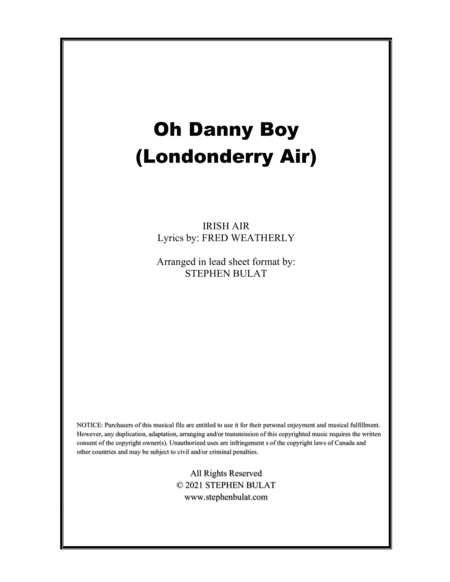Large Ensemble Alto Recorder,Alto Saxophone,Banjo,Bassoon,Clarinet,English Horn,Flute,Guitar,Harpsichord,Oboe,Organ,Piano,Soprano Recorder,Soprano Saxophone,Tenor Recorder,Tenor Saxophone,Trumpet,Ukulele,Viola,Violin,Voice - Digital Download SKU: A0.858905 Composed by Irish Air. Arranged by Stephen Bulat. Celtic,Holiday. Score and parts. 3 pages. Stephen Bulat Publishing #6233151. Published by Stephen Bulat Publishing (A0.858905). This traditional Irish folk song with lyrics by Fred Weatherly is set to the melody of Londonderry Air has been performed by many recording artists including The Irish Rovers, Chet Atkins, The Ventures, Glenn Miller, Bing Crosby, Judy Garland, Dennis Day, Mel Tormé, Tom Jones, Johhny Cash, Johnny Mathis, The Celtic Tenors, The Irish Tenors, Carly Simon and Elvis Presley. A Celtic and Irish Songbook must-have, this arrangement has been gig-tested and has a very easy to follow roadmap with all essential music notes, musical cues and rehearsal markings throughout. Arrangement is in lead sheet format (melody, lyrics & chords) with the layout in a larger style font than lead sheets in a typical fakebook. This format can be used for guitar sheet music, for piano sheet music, as instrumental sheet music, vocal sheet music or as accompaniment to a soloist (violin, flute, singer)The perfect addition to the working musician's gig book. Please click on the publisher to view this song in other keys as well as to purchase it in the Celtic Fiddle Fake Book or in Classic Love Songs - A Valentine's Day Fake Book.*PLEASE NOTE: The preview page may be in a different key than the purchased key.SMPPress publisher page: https://www.sheetmusicplus.com/publishers/stephen-bulat-sheet-music/3007289Online: http://stephenbulat.com
